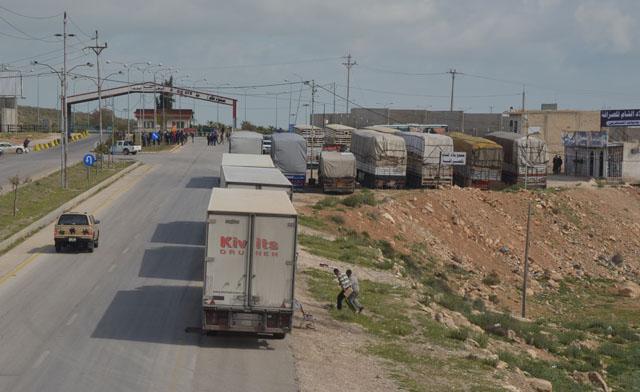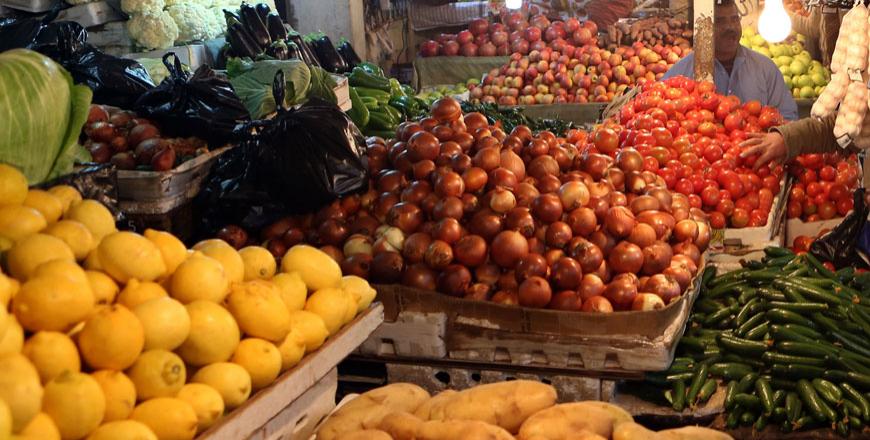You are here
Agriculture exporters not benefitting from opening Syria border — sector leader
By Hana Namrouqa - Oct 31,2018 - Last updated at Oct 31,2018
AMMAN — A Syrian delegation representing farmers, exporters and importers is scheduled to visit the Kingdom in two weeks to discuss the exchange of fruit and vegetables between the two countries, according to a local sector representative.
The Syrian delegation is expected in Jordan in mid-November after representatives of Jordan’s agricultural sector cancelled a trip to Damascus which was scheduled to take place late last week to prepare the ground for resuming agricultural trade between Jordan and Syria.
Asked why the visit was called off, he said that there was no specific reason except that “we were there two months ago and just thought it is their turn to come”.
President of the Jordan Exporters and Producers Association for Fruit and Vegetables Saadi Abu Hammad said that agricultural sector representatives in both countries decided to meet in Amman, noting that Jordanian producers, importers and exporters travelled to Syria two months ago and met with their Syrian counterparts.
“Despite reopening our borders in the middle of this month with Syria, we did not resume exporting. We are actually importing from Syria produce that is not available in the Jordanian market now, like apples, pears and certain vegetables,” Abu Hammad told The Jordan Times.
He underlined the importance of the upcoming meeting in deciding which types of fruit and vegetables Jordan can export to Syria during winter and with what quantities.
“Winter fruit and vegetables produced at the Jordan Valley are abundant, therefore, it is very important to find marketing portals to export them, mainly citrus fruits,” Abu Hammad noted.
The agriculture expert underscored that Jordan’s agricultural sector currently is not actually benefitting from reopening the Jaber/Nasib border crossing because Syria’s borders with Turkey remain closed.
“Syria was never Jordan’s main end destination of fruit and vegetables, it was our portal and gateway to reach the European market, especially during winter,” he noted.
The sector pins its hopes on the Bab Al Hawa border crossing between Syria and Turkey opening soon so that the sector can recover.
Delegates of both countries, representing the private sector, will report to their governments the results of the meeting so that authorities do their part in facilitating the agricultural trade flow, he said.
In April 2015, Jordan closed the Jaber border crossing with Syria for security reasons. Passenger and cargo traffic was halted as a result of the escalating violence in the Syrian town of Nasib, just across the border station, some 80km north of Amman.
Before the crisis broke out seven years ago, Jordan used to export more than 250,000 tonnes of fruit and vegetables every year to Syria and Europe. Jordan’s farmers and the entire agricultural sector suffered huge losses since the closure of the borders as Jordan’s annual production of fruit and vegetables at the time stood at around 2.5 million tonnes, 75 per cent of which is produced in winter and half of that is destined for exporting.
Related Articles
AMMAN — The first delegation representing Jordan’s producers, exporters and importers of agricultural produce is set to head to Damascus on
As Jordan’s border with Syria has remained closed for over a month now, merchants and exporters of agricultural produce are waiting for a breakthrough to resume trade movement to Syria, the Kingdom’s portal to East Europe and Mediterranean countries.
AMMAN — The Syrian crisis has had its deep negative impact on Jordan in many aspects as the country struggles with the seemingly non-stop re

















